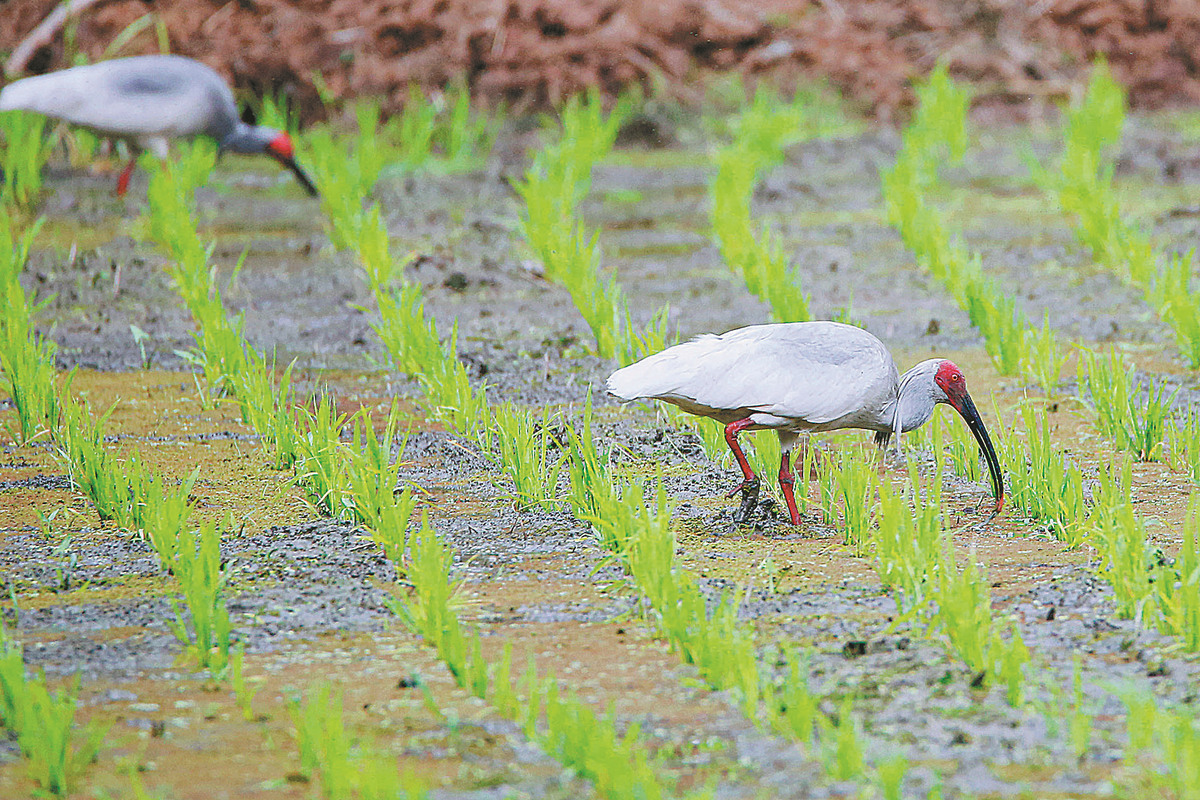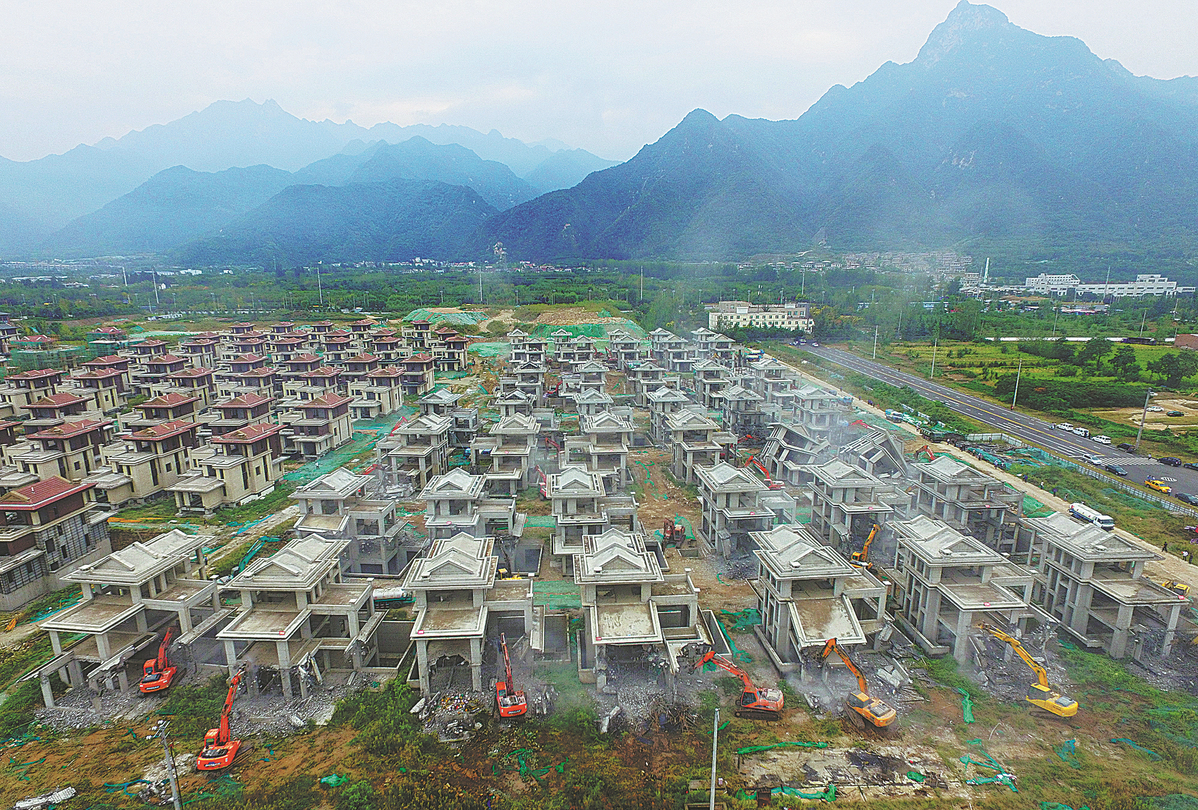Nation Makes Rapid Progress Toward Greener Future

Erhai Lake in Dali, Yunnan province, boasts beautiful scenery that includes wetlands. Mao Yanzheng/For China Daily
Ecological and environmental protection efforts rewarded
After living aboard and fishing from sampans for most of her life, Chen Lanxiang never imagined a life away from the Yangtze River.
Her family's floating home near Ma'anshan, Anhui province, which lacked running water and electricity, had witnessed the depletion of stocks in China's longest river as a result of overfishing and deteriorating ecological conditions."In the 1990s, we harvested dozens of kilograms of fish from the Yangtze every day. Then, the number of fish we caught started to drop. Eventually it became so difficult, that catching just a few dozen kilos of fish a day was a big event for us," she said.
Chen is among some 231,000 people who used to fish the river before deciding to move ashore as China enforced a ban to protect aquatic life as stocks in the Yangtze dwindled and biodiversity declined.
Protecting the river and providing those who used to fish it with new livelihoods were emphasized by President Xi Jinping when he visited Ma'anshan in August 2020.
Xi, also general secretary of the Communist Party of China Central Committee, inspected the Yangtze and the progress made in ecological restoration work as he took a walk along one of its banks.
He said that enforcing the fishing ban must be coupled with aid packages to enable those willing to quit fishing to prosper from new jobs.
Xi reiterated the importance of promoting well-coordinated environmental conservation and avoiding excessive expansion in developing the Yangtze River Economic Belt, calling for stronger awareness of the need to love and protect the waterway.
For many observers, the 10-year Yangtze fishing ban is just one example of the efforts made over the past decade that epitomize the nation's unprecedented commitment to environmental and ecological protection.
"We must protect ecology and the environment the same way we protect our eyes and treat life," Xi told legislators from Jiangxi province during the annual parliamentary session in 2015.
Dimitri De Boer, chief representative of the environmental law organization ClientEarth in China and also team leader of the EU-China Environment Project, said, "It has been a really amazing decade."
He said Xi has overseen a 10-year drive to tackle some of the worst threats to China's environment and public health, including pollution in the air, soil and water.
"There has really been a big shift in the level of attention paid to the environment and in public awareness about the environment over the past decade," De Boer said, adding that unwavering efforts from the government and the public have resulted in a rapid improvement in the quality of air and water.

Rice fields provide a habitat for ibises in Ankang, Shaanxi province. Wei Yongqian/For China Daily
Xi has made ecology and the environment a centerpiece of his fact-finding trips to the nation's 31 provincial areas, highlighting the importance of this issue to China's long-term development.
During an inspection trip of Beijing in February 2014, when air pollution was the top public concern, he made a strong appeal for treatment of pollutants, especially PM2.5 particulate matter.
Xi told city officials during the trip that the primary task of improving air quality was to curb PM2.5. He also laid out measures to reduce the use of coal, cap the use of vehicles, and to adjust the industrial structure.
In September 2013, the State Council, China's Cabinet, introduced an action plan to prevent and control air pollution, including a series of steps to cut emissions of major pollutants, renovate power plants, and encourage the use of non-fossil fuels.
Preventing and controlling pollution was listed as one of the three critical battles for the nation in Xi's report to the 19th National Congress of the CPC in 2017.

Illegally built villas were demolished in the Qinling Mountains, Shaanxi, in 2018. Yuan JjingZhi/For China Daily
Invaluable assets
The philosophy that "lucid waters and lush mountains are invaluable assets", first put forward by Xi when he was the top official in Zhejiang province in 2005, is also a key factor underpinning China's environmental efforts, according to analysts.
In April 2020, Xi visited a national nature reserve in the Qinling Mountains, a natural boundary between the north and south of China and home to a wide variety of plants and protected animals. The president highlighted the importance of parallel efforts in ecological protection and restoration of the mountains.
From 2014 to 2018, Xi issued six instructions on the illegal construction of luxury villas at the northern foot of the mountains in Shaanxi province, calling for local authorities to demolish the buildings, restore the environment and root out corruption.
"Illegal construction in the Qinling Mountains is a big lesson," he said during his tour in 2020. "From now on, any official working in Shaanxi should above all learn this lesson, avoid repeating the same mistake, and work as a guardian of the ecological environment of the mountains."
Xi has also visited the Qilian Mountains on the border of Qinghai and Gansu provinces, the Wuyi Mountains on the border of Fujian and Jiangxi provinces, and the Wuzhi Mountains in Hainan province. He told local officials to phase out work harmful to the environment and bolster ecological protection and restoration efforts.
The protection of rivers and lakes was also placed high on Xi's agenda during his inspection trips.
During a visit to Erhai Lake, Yunnan province, in 2015, he inspected wetlands and listened to reports of efforts to protect the lake, whose water quality has been affected by tourism industry development, especially guesthouses and restaurants.
Xi told officials that developing the economy must not come at the cost of ecology and the environment, adding that protection work requires long-term and persistent efforts.
This visit marked the start of a far-reaching cleanup drive to improve the water quality of the wetlands at this scenic spot, with local authorities allocating at least 4.5 billion yuan ($671.4 million) to treat sewage and tackle other pollutants.
The pollution and deteriorating ecological conditions on the Yangtze River were also among Xi's major concerns.
In April 2018, he made a two-day fact-finding trip to Hubei and Hunan provinces, during which he visited a chemical plant and the Three Gorges Dam, before taking a boat trip downstream on the river and visiting a national nature reserve beside the waterway.
Xi told officials on the trip, "We can never allow the ecology and environment of the Yangtze River to continue worsening in our generation, and we must leave behind a clean and beautiful Yangtze for future generations."
Chen, the former fisherwoman from Ma'anshan, said it felt as if the sky was falling down when the fishing community was told that the ban had been put in place.
"Most of us were illiterate and knew nothing apart from fishing," she said.
However, with the support of government subsidies, those fishing in the Yangtze hung up their nets, before being relocated to new homes.
Chen started a labor service company with eight other former fishing families. She also took on work that included sanitizing the Yangtze and greening its banks.
Her husband, after initially struggling to land a new job, now protects species from illegal fishing.
"It is easier for the fishermen to work near the river, as they have developed emotional attachments to the Yangtze," Chen said.
Wan Jun, chief engineer at the Chinese Academy of Environmental Planning, said Xi has always kept in mind the big picture for China's environmental and ecological protection efforts during his inspection trips.
He said the president has placed equal emphasis on the protection of mountains, water bodies, forests, farmland, lakes, grasslands and beaches.
"Ecology and the environment have been an important part of all his trips, and he has given instructions based on the nation's overall perspective," Wan said.
He added that the strong emphasis placed by Xi on such work has been central to the nation's remarkable achievements in environmental and ecological protection, which could be on par with the phenomenal economic growth it has witnessed over the past decade.
"The most important factor for this success is a philosophy that Xi advocates wherever he goes-Xi Jinping Thought on Ecological Civilization," Wan said.
He added that central to this Thought, a set of effective systems for ecological and environmental protection work has underpinned the nation's success in this regard, including the Party's leadership, central-level supervision of such protection, and ecological subsidies.
In a remarkable sign of improving air quality, Beijing, which used to be plagued by smog, saw its average concentration of hazardous airborne PM2.5 particles fall last year to 33 micrograms per cubic meter, down from 89.5 in 2013.
Wang Ruchun, who lives in Shijiazhuang, capital of Hebei province, has photographed the sky outside his apartment for the past eight years.
He said the number of clear-sky days has risen over the years as the provincial authorities enforced heightened environmental protection measures. Last year, Shijiazhuang saw 197 more days with good air quality compared with 2013.
"The environment is part of public wellbeing, and blue sky means happiness for me," Wang added.
Zhu Lixinin Hefei contributed to this story.
